Kajarte was designed by tegobash, a Polish student of Arabic, as an alternative way of writing Polish, Arabic and English using the Latin alphabet. It is based on another of his inventions, hand-written Kajara. Visually Kajara was loosely based on Arabic although it is difficult to see this resemblance in Kajarte. Since it is constructed from glyphs already existing in natural alphabets Kajarte is almost fully supported by most of the text editors.
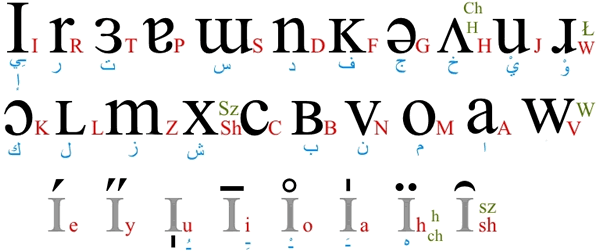
Key: Kajarte, English, Arabic, Polish (when different from English) voiceless
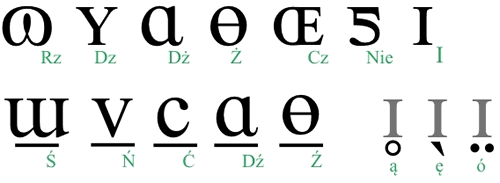
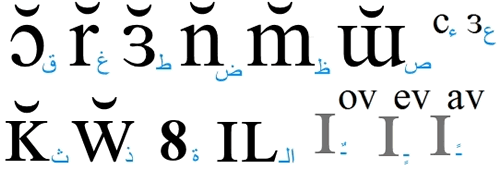
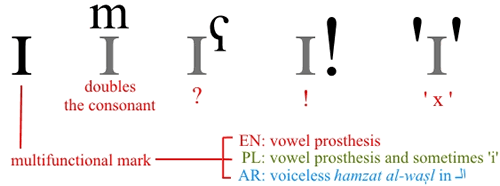
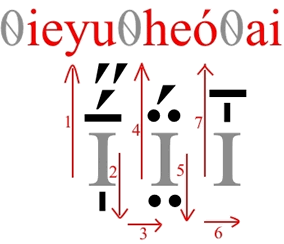
The diacritical marks above the letter are first to be read. Then you read diacriticals below the letter. Sometimes you cannot write all diacriticals above just one character: for example, if you want to write word 'duch' (ghost)you will need to add an additional voiceless ɪ character: n̩ɪ̈ (or: n̩ʌ). Also sometimes you need to use ɪ because previous character does not look well with lots of diacritical marks.
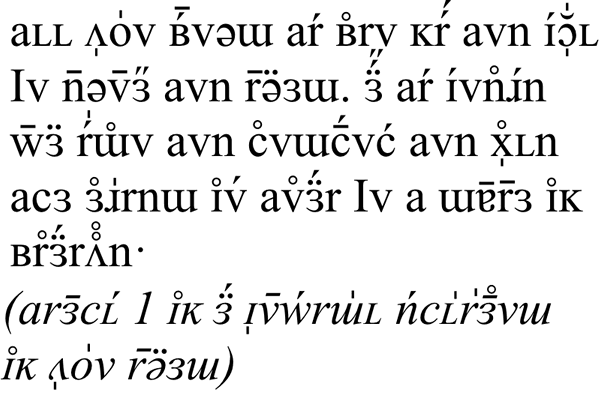
All human beings are born free and equal in dignity and rights. They are endowed with reason and conscience and should act towards one another in a spirit of brotherhood.
(Article 1 of the Universal Declaration of Human Rights)
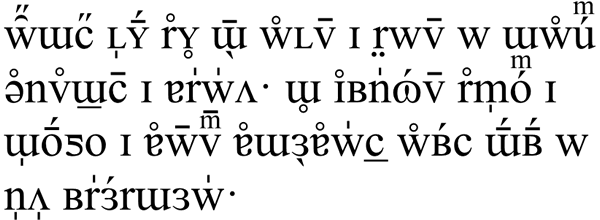
Wszyscy ludzie rodzą się wolni i równi w swojej godności i prawach. Są obdarzeni rozumem i sumieniem i powinni postępować wobec siebie w duchu braterstwa.
(Artykuł 1, Powszechna Deklaracja Praw CzŁOwieka)
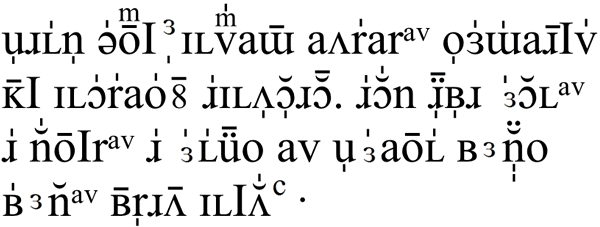
يولد جميع الناس أحراراً متساوين في الكرامة والحقوق. وقد وهبوا عقلاً وضميراً وعليهم ان يعامل بعضهم بعضاً بروح اﻹخاء.
(إعلان عالمي لحقوق الإنسان، المادة 1)
Yūladu jamī'u n-nāsi aḥrāran mutasāwīna fī l-karāmati wa-l-ḥuqūq. Wa-qad wuhibū 'aqlan wa-ḍamīran wa-'alayhim an yu'āmila ba'ḍuhum ba'ḍan bi-rūḥi l-ikhā'.
Constructed scripts for: Ainu | Arabic | Chinese languages | Dutch | English | Hawaiian | Hungarian | Japanese | Korean | Lingala | Malay & Indonesian | Persian | Tagalog / Filipino | Russian | Sanskrit | Spanish | Taino | Turkish | Vietnamese | Welsh | Other natural languages | Colour-based scripts | Tactile scripts | Phonetic/universal scripts | Constructed scripts for constructed languages | Adaptations of existing alphabets | Fictional alphabets | Magical alphabets | A-Z index | How to submit a constructed script
[top]
You can support this site by Buying Me A Coffee, and if you like what you see on this page, you can use the buttons below to share it with people you know.

If you like this site and find it useful, you can support it by making a donation via PayPal or Patreon, or by contributing in other ways. Omniglot is how I make my living.
Note: all links on this site to Amazon.com, Amazon.co.uk
and Amazon.fr
are affiliate links. This means I earn a commission if you click on any of them and buy something. So by clicking on these links you can help to support this site.
[top]